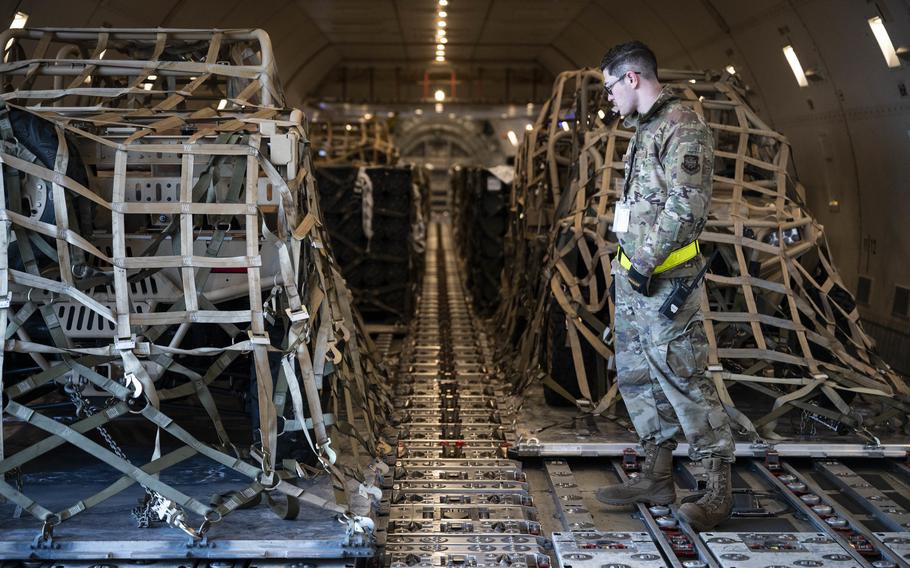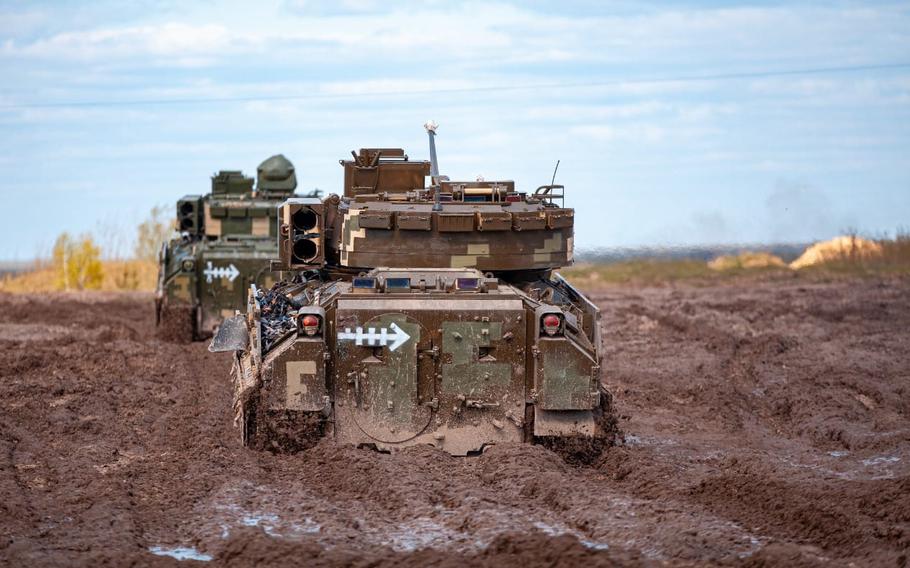
A U.S. airman observes while tactical vehicles, bound for Ukraine, are secured inside a commercial aircraft at Dover Air Force Base, Del., Jan. 20, 2023. A recent Defense Department Inspector General report found that at least $1.1 billion in Ukraine aid lacked adequate documentation. (Marco Gomez/U.S. Air Force)
A Defense Department audit has found that $1.1 billion in payments meant to support Ukraine in the months following Russia’s full-scale invasion of the country lacked proper documentation, raising concerns over financial accountability and transparency in U.S. military aid.
However, the DOD Inspector General also found that service members were largely untrained to do the paperwork and the Pentagon response to the report indicated it wasn’t particularly interested in more training.
The audit by the IG reviewed $2.1 billion in approved funds for Kyiv in 2022. It found that 323 payments, or 67% of the total, either lacked paperwork or were improperly recorded, leaving officials unable to confirm whether the funds were used for their intended purposes.
The unsupported payments included $17 million the Navy spent on fuel and other expenses in Europe unrelated to Ukraine, the IG said in a report of its findings released Tuesday.
The findings have raised concerns of potential violations of the Antideficiency Act, which prohibits spending unauthorized by Congress.
Due to the urgency in distributing funds intended to bolster Ukraine’s defense following Moscow’s invasion in February 2022, DOD personnel faced pressure to execute payments quickly.
“This quick reaction led to a breakdown in internal controls,” the report said.
The DOD’s Financial Management Regulation and Joint Travel Regulations both require a lot of paperwork to support government payments.
Each payment must be accompanied by disbursement vouchers, invoices and details that outline the purpose and accuracy of the spending. The IG found that these requirements were often ignored or incomplete.
For 264 payments, or 82% of the unsupported transactions, the DOD failed to properly justify the use of supplemental funds for Ukraine.

Bradley Fighting Vehicles maneuver through muddy terrain in Ukraine in an undated photo shared by the Ukrainian Defense Ministry on X. U.S.-supplied equipment is part of the more than $1 billion in aid under scrutiny for lacking documentation in a recent Pentagon audit. (Ukrainian Ministry of Defense)
Communication challenges contributed to the issues, the report said.
Personnel didn’t receive clear or detailed guidance on how to document the purpose of funds, the IG found, adding that in some cases, DOD personnel interpreted high-level directives and laws on their own.
In June, defense officials provided the IG with additional documents for 27 of the 323 unsupported transactions.
Of those, only 12 were deemed properly executed, while the remaining 15 were said to be inadequate or unrelated to Ukraine’s defense.
Some of the deficiencies identified underscored how confusing the rules might be to the untrained.
For example, the IG report stated that $2 million spent by the Air Force on the European Deterrence Initiative was “unrelated to the Ukraine mission,” even though the initiative was created because of Russia’s 2014 invasion of Ukraine.
As the audit examined only a portion of all Ukraine-related transactions, the IG warned that similar issues could affect the remaining $76.3 billion in additional appropriations approved through April 2024.
Defense officials agreed to review documentation to determine whether the $1 billion in questioned costs supported the Ukraine assistance mission and were accurate, and to take appropriate action if not.
However, the Pentagon’s comptroller mostly disagreed with the IG’s recommendations, which included more training on documentation procedures and clearer guidance.
Calls by the IG for Navy and Air Force officials to review potential violations of the Antideficiency Act also remain unresolved.
The IG said it will track its recommendations until “management has agreed to take actions that we determine to be sufficient.”